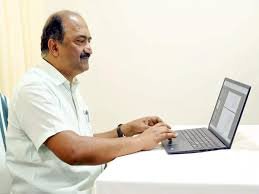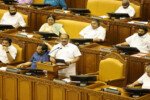Thiruvananthapuram, July 26 (PTI): It is wrong to classify borrowings by state-run entities like KFIIB as part of the overall debt of the LDF government in order to curtail its borrowing powers, Kerala chief minister Pinarayi Vijayan said on Tuesday.
Vijayan said the state government has asked the Centre to withdraw such measures as otherwise it would defeat the developmental efforts of Kerala Infrastructure Investment Fund Board (KIIFB) for which it was created.
Speaking to reporters here, he said KFIIB was paying off its loans from its own revenue stream and the state government was only guaranteeing its borrowings.
“Therefore, it is wrong to classify its borrowings as a debt of the state,” Vijayan said.
His statements on the issue come in the wake of a letter sent last week by Kerala Finance Minister K N Balagopal to Union Finance Minister Nirmala Sitharaman raising concerns over some of Centre’s actions in the past five years over fixing states’ net borrowing ceiling.
In his letter, Balagopal has contended liabilities of state instrumentalities, like statutory bodies and companies, do not come within the definition of state debt.
Therefore, combining debt of such entities with that of the state government is contrary to the provisions of the Constitution and would “imperil” the borrowing powers of the states and “jeopardise” their development plans, he said in his letter dated July 22.
He requested Sitharaman to exclude balances in the public account of the states and borrowings by entities run by them while determining their net borrowing capacity, as was the situation before August 2017, in view of the grave financial crisis Kerala was facing.
The matter assumes significance as the guarantee given by the state to borrowings by special purpose vehicles like the KIIFB and the Kerala State Social Security Pension Limited (KSSPL) have been defined as the state government’s debt by the Centre.
On July 25, Sitharaman, had informed the Lok Sabha that borrowing by state public sector undertakings or their special purpose vehicles (SPVs) will be considered as borrowing by the state government needing consent.
Balagopal, in his letter, further said Kerala was currently facing a grave financial crisis which poses a serious threat to the government in sustaining spending on welfare schemes for the poor, including housing, education and health.
“The financial health of the state has been seriously affected by a reduction in the revenue deficit grant to the tune of around Rs 7,000 crore this year and loss due to stoppage of GST compensation of around Rs 12,000 crore.
“In addition, the Ministry of Finance has arbitrarily, in the name of off-budget borrowing, made a reduction of approximately Rs 4,000 crore in the net borrowing limits of the State. In all, the State government will have to contend with a reduction of Rs 23,000 crore in the financial resources available to it for financing the budget in the current financial year,” he said.
If these realities being faced by Kerala, as it struggles to emerge from the “economic debilitation wrought by the covid pandemic”, are not recognised by the Centre, the socio-economic security system it has built over the last several decades will be in jeopardy, he said.
The CM spoke on similar lines during his media briefing, adding, despite the state’s financial constraints, it intends to distribute Onam kits this year too, like it had done in the previous years.
Sitharaman, in her written reply to the Lok Sabha, had said instances of borrowing by certain state public sector companies, SPVs and other equivalent instruments, where principal and/or interest are to be serviced out of the state budgets, had come to the notice of the Ministry of Finance.
She had said such borrowings would be considered as that by the state and would need the consent of the Centre under Article 293 of the Constitution.
Balagopal contended in his letter that Article 293 can only be “legitimately” used for imposing conditions related to a request for borrowing of a state government and not to control or administer its borrowing.
He said that even if for sake of argument Article 293 is made applicable upon overall annual borrowing programme of states, it could at the most apply to a state’s share of open market borrowings and loans from central PSUs and financial institutions like LIC, NABARD etc., which are regulated administratively by the Union government.
Balagopal also said the point of concern was that over the last five years, under the the declared objective of fixing the net borrowing ceilings, Article 293 was being allegedly “used to vitiate the state’s independence and make systematic inroads into the financial autonomy of state governments, enshrined in our Constitution.”
“…the requirement that a state must obtain consent under clause (3) of Article 293 of the Constitution of India is applicable only when a state is either indebted to the Centre, or when repayment of a loan taken by the state which the Centre has guaranteed remains outstanding,” he has claimed.
However, what the central government was doing was “far beyond what is contemplated in the Constitution”, he has said in his letter.







